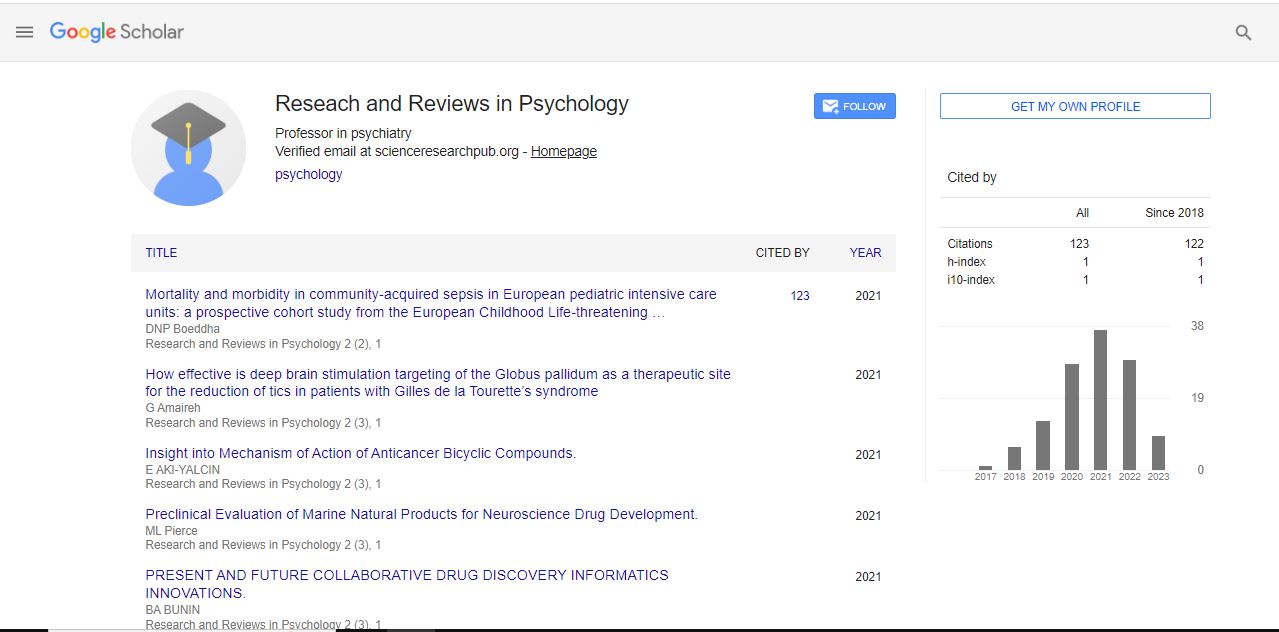Perspective, Research And Reviews In Psychology Vol: 3 Issue: 1
Resilience in the Face of Inequalities of Access to Healthcare in Immigrant Communities: How Africans in China Cope During COVID-19 and Other Infectious Disease Outbreaks
Adams*
Department of Psychology, GITAM Institute of Science, Bangalore, Karnataka
*Corresponding Author: Adams
Department of Psychology, GITAM Institute of Science, Bangalore, Karnataka
Email: adams.bodomo@univie.ac.at
Received date: 28 January 2022, Manuscript No. RRPY-22-11829;
Editor assigned date: 01 February 2022, Pre QC No. RRPY-22-11829 (PQ);
Reviewed date: 10 February 2022, QC No. RRPY-22-11829;
Revised date: 16 February 2022, Manuscript No: RRPY-22-11829 (R);
Published date: 25 February 2022, DOI:10.4172/rrpy.1000314.
Keywords: COVID-19
Introduction
In this paper, I raise the issue of resilience as an important concept in understanding how Africans in China cope with barriers to their well-being in China. Resilience is a concept that deals with how well people or living entities adapt to an environment in spite of unfavorable, even threatening conditions. I begin by highlighting inequality of access to healthcare, as an important aspect of the many types of inequalities Africans face in their China sojourn. By inequalities of access to health care, I mean asymmetrical relations between entities at various levels of social interactions, including government-to-government relations, community-to-community relations, and individual-to-individual relations in regard to health care access. These asymmetrical relations lead to differences in access to various resources within the polity or community and this asymmetrical access has consequences for the well-being or otherwise of the community and the individual within the community. In particular, since this paper is about migrant communities, especially the African diasporic communities in China, I will argue that there are some historical and contemporary inequalities between Africans in China and most of their hosts, and as a result Africans in China have often, though not always, lived on the margins of the Chinese societies they find themselves in.
A Case Study of Access to Health Care
I begin this section of the paper (a case study) by outlining the specific methodological issues involved in carrying out the study on access to health care. Following this, I then outline the coping mechanisms involved.
Methodological Specifications
In terms of physical health care, qualitative interviews and participant-observation revealed that the community organizations also compile and manage information about visiting family members who are doctors and nurses from Africa for their members and encourage these visiting specialists to informally consult with sick people on a voluntary basis. Patients, once their illness is diagnosed, can exploit the lapses in the pharmaceutical system in Guangzhou to buy medicines without prescription.
In terms of emotional health care, loneliness and the feeling of up-rootedness from their African socio-cultural structures being a major issue in the African diaspora in Guangzhou and other parts of the world, artists, musicians, and emerging cultural icons in the African community are important emotional health care providers. In restaurants, at various festive gatherings, and especially in night, verbal artists like poets and praise-singers act as motivational speakers to uplift the spirits of the down-trodden in the African community; musicians make the immigrants reconnect to their cultural roots through songs and dances. Emerging cultural icons like travel magazine editors, budding film makers, and video-shop managers enable lonely and homesick Africans to reconnect to their homeland cultural scenes and happenings, like getting abreast with the latest Hollywood film and pop music charts.
Coping with Discrimination during COVID-19
Focusing now on the COVID-19 pandemic, these copying mechanisms were largely tested during April 2020 in the height of the COVID-19 pandemic. China, which seemed have contained the virus suddenly started seeing cases, not only in Wuhan but other cities of China, including Guangzhou. It was claimed these new cases were as a result of foreigners travelling to China and bringing in the virus. In fact, the truth was that it was mostly Chinese returning home who were bringing back the virus. But this did not stop many authorities from stoking racial profiling against Africans in the city of Guangzhou and its environs. Both African traders and students were harassed, some forcibly quarantined, some ejected from their own apartments and hotel rooms, and many refused entry into restaurants. Even McDonald eatery had to apologize for refusing entry to Black People, after posting the notice below for the attention of Blacks in Guangzhou.
How did community leaders react to this? Besides continuing to do all the things they did during previous disease outbreaks, they quickly compiled information about locations of people who were quarantined and arranged to send them food and other basic needs. They also arranged for their consuls to intervene by getting to the Guangzhou/Guangdong government, especially its Guangzhou Public Security Bureau, which is a government department many of whose security forces have continued to harass Africans in Guangzhou for more than 15 years now, and demanding that they give back seized passports and generally stop the harassment of Africans in the city.
 Spanish
Spanish  Chinese
Chinese  Russian
Russian  German
German  French
French  Japanese
Japanese  Portuguese
Portuguese  Hindi
Hindi 